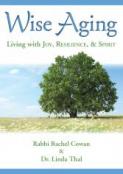- Home
- Play & Learn Home
- Online Enrichment
- Experience Modern Israel
- Israel It's Complicated
- Jewish and Me
- Jewish Holidays Jewish Values
- Jewish Values in Genesis and Jewish Values in Exodus
- Min Ha’aretz
- Our Place in the Universe
- Simply Seder
- The Prophets: Speaking Out for Justice
- Making T'filah Meaningful
- Make, Create, Celebrate
- Yom Haatzmaut Resources
- Hebrew Apps
- About The OLC
- What is the OLC?
- Introduction
- Get Started
- Resources
- OLC Content
- Parent Materials
- See My OLC Classes
- Store
Build Connections with Boomers
Written by Behrman House Staff, 14 of June, 2016
It turns out that school isn’t just for young people. Universities are noticing increasing enrollment in doctoral programs by older adults, who are drawn to seeking to enhance or change their careers or are motivated by a search for meaning.
“Students are asking what they can do with the rest of their lives, and how they can have an impact,” according to Katrina Rogers, president of Fielding Graduate University in California, in a recent New York Times article. “They are approaching graduate school as a learning process for challenging themselves intellectually, but also along cognitive and emotional lines.”
While striving for a PhD isn’t likely in the cards for most adults, this quest for meaning embodies the spirit of a generation described by Ron Wolfson in Relational Judaism as “seekers of self-actualization.”
Fulfillment comprises one key to a happy life. There’s also a powerful correlation between your happiness in your later years and the warmth of your relationships.
A 75-year-long Harvard University study on what men need to live a happy life documented for the first time what it’s like to flourish beyond conventional retirement. (And no, that 75 is not a typo. Started in 1938, it is the longest-running longitudinal study of human development in history.) It reported that deep relationships with family and community lead to greater health and contentment as people age.
If you’re thinking about how to engage this Baby Boomer generation – those seekers who also comprise a demographic essential to your Jewish community – consider programming to help them learn to find meaning in aging.
Many Jewish communities are forming groups to help people approach aging mindfully, and confront its challenges and opportunities. They use Wise Aging: Living with Joy, Resilience, and Spirit by Rabbi Rachel Cowan and Dr. Linda Thal as their guide. The program combines Jewish texts and secular writings with exercises on mindfulness and meditation, heartfelt discussion, and prayer to challenge participants to embrace this third chapter of their lives.
Last fall, Congregation Shaare Emeth in St. Louis began a Wise Aging group and sent Debbie Bram, director of Jewish Life and Learning, and colleague Sharon Weissman for training by The Institute for Jewish Spirituality on leading the group using the book. Joining a Wise Aging group requires a different kind of commitment than other adult learning classes, something that Bram initially thought might dampen enthusiasm. But she was pleasantly surprised to find “an overabundance of interest in the program,” and the congregation now runs three groups.
"The value of the Wise Aging group is huge," says Bram. "First, the interest has been overwhelming, which shows there is a need. Second, the commitment is large and yet people are making the commitment. The way Jewish text, prayer, meditation, Mussar and middot are used to help Baby Boomers think of aging in a different way is extremely powerful. There are people in the group who I have not seen at other programming at Temple. They now are coming to other programs as they feel more connected to the community as well."
The success of Wise Aging groups across the country – from Boston to Phoenix – demonstrate the hunger of older adults for programs that develop connections, help them seek meaning, and build community. Win-win all around.
READ: Six Steps to Start a Wise Aging Group in Your Synagogue


